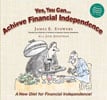Investment Risk and the Growth of Wealth: The Importance of Course Corrections
I have a problem. In fact, I think we all have a problem:
We have been way too focused on returns, resulting in the utter destruction of our wealth.
The investment industry has been built using tools that might be appropriate for understanding investments, but are totally worthless for investors. In real life, real people, using real money do not care about returns. We care about our wealth, and the two are not the same. They are not the same!
Why I love the Roth IRA
Want tax-free investment growth? Want more control over your retirement savings? Want to leave a bigger inheritance? If so, you should consider contributing to or converting existing retirement savings to a Roth IRA.
For Not-Yet-Retirees
The biggest difference between a Roth IRA and a traditional IRA is the tax treatment of contributions and withdrawals. With the Roth, contributions aren't tax-deductible, but withdrawals are tax-free (as long as you follow the rules). For the traditional IRA, contributions might be deductible; investments grow tax-deferred, but withdrawals are taxed as ordinary income — the highest rate possible.
To decide which is best for you, start by determining if you'll be able to deduct contributions to a traditional IRA. If you're not covered by a plan at work, a contribution to a traditional IRA is fully deductible. If you are covered, then deductibility begins to phase out at an adjusted gross income (AGI) of $55,000 for single filers ($89,000 for married couples) and is gone completely at an AGI of $65,000 ($109,000). Contributing to the Roth is then a no-brainer, assuming you're eligible (see fact sheet below). Continue reading...
Yes, You Can Achieve Financial Independence

Your Money or Your Life defines Financial Independence as "having an income sufficient for your basic needs and comforts from [sources] other than paid employment". Financial independence implies freedom. It's the condition of having saved enough money that you can do whatever you choose. Whether you elect to keep working doesn't matter — you have enough saved and invested to follow your dreams.
But is Financial Independence just a pipe dream? Is it something only for the lucky and the strong? No, says James Stowers in his book, Yes, You Can...Achieve Financial Independence. It's a goal that anyone can fulfill as long as she's armed with some basic knowledge, as long as she makes smart choices.
<How to take a sabbatical

In his book, The 4-Hour Workweek, Tim Ferriss proposes that we shift our focus from end-of-life "macro" retirement to more frequent mini-retirements, which might be spaced throughout a working career. Consider it a type of sabbatical, but one that you can take multiple times throughout your working life -- and not reserved for academics or the super rich.
Ferriss took time to speak with me about his notion of mini-retirements. Last week, I published the first part of the interview, in which he discussed using mini-retirements to get more out of life. In today's excerpt, he provides some real-life examples of how to put this concept in action.
Using mini-retirements to get more out of life: An interview with Timothy Ferriss
On a cool Thursday morning last July, I woke early to walk into the hills outside Wells in Somerset County, England. After three-quarters of an hour, I reached a point with a broad vista of the surrounding countryside. I leaned against a fence post and took in the view — I could have sworn I was looking at Hobbiton.

After a few minutes of silent contemplation, I walked back to town. I took a brief tour of the Wells Cathedral before picking up a bite to eat a nearby bakery. I then joined the rest of my group for our drive to Stonehenge. In the evening, we stopped in Dorchester, where Kris and I gave ourselves a self-guided tour of the city.
We were standing in the Maumbury Rings when I announced, "I want to retire here." Continue reading...
A real millionaire next door
Kris and I love our neighborhood. People are friendly and helpful, yet mostly mind their own business. It's a perfect combination. One of our favorite neighbors is the old guy next door. Let's call him John.
John is a 71-year-old retired shop teacher who lives in a modest ranch house on half an acre, the same house he's had for over forty years. He has an old barn filled with salvaged lumber, outdated appliances, and who knows what else. When he's around, he drives a junkie 25-year-old station wagon. But most of the time, he's not around.
He spends his winters in New Zealand helping friends on a dairy farm. His summers are spent fishing in Alaska. For a couple of months each year, he's home, puttering in the yard. Year-round, he rents his house to boarders. He leads a very active retirement.
I quit my job — What should I do with my 401k?

When you leave your job, you have several choices regarding your 401(k). These options for a 401(k) rollover are pretty much universal, meaning they apply to every 401(k) and to every job change situation. Your options are:
Cash the 401(k) Plan and Receive a Full Pay-Out
I've listed this option first because it has the most serious ramifications.
The Compound Return Marathon: Which Retirement Strategy Will Win?
Before we fire off the gun to start the 'Compound Return Marathon', let's cover some basics on what compound returns are and why you should care.
What is compound interest?
You probably became familiar with the term 'compound interest' when you first started placing money in your bank accounts. Most of us recognize compound interest as the interest we receive from holding money in a savings account, certificate of deposit, or other low rate of return investment at the bank. Any form of compound interest is great, but this post isn't about avoiding depreciation in cash value by earning just enough to out-pace inflation with low rate returns (which is about all no risk interest accounts are able to do). Let's discuss a different type of compound interest.
Compound returns
When you purchase index or mutual funds, you are often asked what you would like to do with any dividend or capital gains disbursements from that particular investment's holdings. When you select that you would like to 're-invest', you are, in effect, compounding your returns. The same goes for dividend producing stocks. You are offered the choice of receiving your dividend in the form of a cash payout, or re-investing the amount into more stock.
Which is better: a Roth IRA or a traditional IRA?
When the subject of Individual Retirement Accounts (IRAs) comes up, the one question that seems to cross everyone's mind is: Which investment vehicle is better, a Roth IRA or a traditional IRA?
The subtle differences between the two types of IRAs are the source of all the confusion, but the answer depends largely on whether you expect to be in a higher or lower tax bracket when you start to draw funds out in retirement -- however, there is actually more to consider than just your tax bracket.
Four Important IRA Features to Consider
For most Get Rich Slowly readers, the four most important considerations are these:
Book review: The Automatic Millionaire

David Bach is perhaps best known for coining the term the latte factor, a phrase that has almost become a joke in personal finance circles. That's too bad, really, because Bach has some good ideas. And the latte factor is a marvelous concept, applicable to many people who casually spend their future a few dollars at a time. Bach's most popular book is The Automatic Millionaire. I've referred to it often, but never reviewed it until today.
The Automatic Millionaire is based on sound financial concepts. The author encourages readers to eliminate debt, to live frugally, and to pay themselves first. But the core of his book is unique: rather than develop will power and self-discipline, Bach says, why not bypass the human element altogether? Why not make your path to wealth automatic?